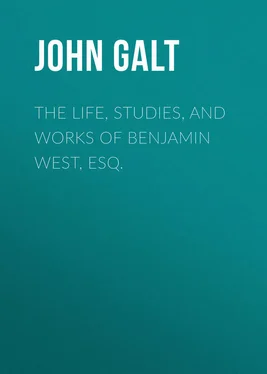John Galt - The Life, Studies, and Works of Benjamin West, Esq.
Здесь есть возможность читать онлайн «John Galt - The Life, Studies, and Works of Benjamin West, Esq.» — ознакомительный отрывок электронной книги совершенно бесплатно, а после прочтения отрывка купить полную версию. В некоторых случаях можно слушать аудио, скачать через торрент в формате fb2 и присутствует краткое содержание. Жанр: foreign_antique, foreign_prose, на английском языке. Описание произведения, (предисловие) а так же отзывы посетителей доступны на портале библиотеки ЛибКат.
- Название:The Life, Studies, and Works of Benjamin West, Esq.
- Автор:
- Жанр:
- Год:неизвестен
- ISBN:нет данных
- Рейтинг книги:5 / 5. Голосов: 1
-
Избранное:Добавить в избранное
- Отзывы:
-
Ваша оценка:
- 100
- 1
- 2
- 3
- 4
- 5
The Life, Studies, and Works of Benjamin West, Esq.: краткое содержание, описание и аннотация
Предлагаем к чтению аннотацию, описание, краткое содержание или предисловие (зависит от того, что написал сам автор книги «The Life, Studies, and Works of Benjamin West, Esq.»). Если вы не нашли необходимую информацию о книге — напишите в комментариях, мы постараемся отыскать её.
The Life, Studies, and Works of Benjamin West, Esq. — читать онлайн ознакомительный отрывок
Ниже представлен текст книги, разбитый по страницам. Система сохранения места последней прочитанной страницы, позволяет с удобством читать онлайн бесплатно книгу «The Life, Studies, and Works of Benjamin West, Esq.», без необходимости каждый раз заново искать на чём Вы остановились. Поставьте закладку, и сможете в любой момент перейти на страницу, на которой закончили чтение.
Интервал:
Закладка:
Provost Smith introduced West, among other persons, to four young men, pupils of his own, whom he particularly recommended to his acquaintance, as possessing endowments of mind greatly superior to the common standard of mankind. One of these was Francis Hopkins, who afterwards highly distinguished himself in the early proceedings of the Congress of the United States. Thomas Godfrey, the second, died after having given the most promising indications of an elegant genius for pathetic and descriptive poetry. He was an apprentice to a watchmaker, and had secretly written a poem, which he published anonymously in the Philadelphia newspaper, under the title of "The Temple of Fame." The attention which it attracted, and the encomiums which the Provost in particular bestowed on it, induced West, who was in the Poet's confidence, to mention to him who was the author. The information excited the alert benevolence of Smith's character, and he lost no time until he had procured the release of Godfrey from his indenture, and a respectable employment for him in the government of the state; but this he did not live long to enjoy: being sent on some public business to Carolina, he fell a victim to the climate.
It is pleasant to redeem from oblivion the memory of early talent thus prematurely withdrawn from the world. Many of Godfrey's verses were composed under a clump of pines which grew near the upper ferry of the river Schuylkill, to which spot he sometimes accompanied West and their mutual friends to angle. In the heat of the day he used to stretch himself beneath the shade of the trees, and repeat to them his verses as he composed them. Reid was the name of the other young man, and the same person who first opposed the British troops in their passing through Jersey, when the rebellion of the Provinces commenced. Previous to the revolution, he was bred to the bar, and practised with distinction in the courts of Philadelphia. He was afterwards elected a Member of Congress, and is the same person who was appointed to meet Lord Carlisle on his mission from the British Court.
Provost Smith was himself possessed of a fluent vein of powerful eloquence, and it happened that many of his pupils who distinguished themselves in the great struggle of their country, appeared to have imbibed his talent; but none of them more than Jacob Duchey, another of the four youths whom he recommended to the Artist. He became a Clergyman, and was celebrated throughout the whole of the British Provinces in America as a most pathetic and persuasive preacher. The publicity of his character in the world was, however, chiefly owing to a letter which he addressed to General Washington, soon after the appointment of that chief to the command of the army. The purport of this letter was to persuade the General to go over to the British cause. It was carried to him by a Mrs. Ferguson, a daughter of Doctor Graham, a Scottish Physician in Philadelphia. Washington, with his army, at that time lay at Valley-forge, and this lady, on the pretext of paying him a visit, as they were previously acquainted, went to the camp. The General received her in his tent with much respect, for he greatly admired the masculine vigour of her mind. When she had delivered the letter he read it attentively, and, rising from his seat, walked backwards and forwards upwards of an hour, without speaking. He appeared to be much agitated during the greatest part of the time; but at length, having decided with himself, he stopped, and addressed her in nearly the following words: "Madam, I have always esteemed your character and endowments, and I am fully sensible of the noble principles by which you are actuated on this occasion; nor has any man in the whole continent more confidence in the integrity of his friend, than I have in the honour of Mr. Duchey. But I am here entrusted by the people of America with sovereign authority. They have placed their lives and fortunes at my disposal, because they believe me to be an honest man. Were I, therefore, to desert their cause, and consign them again to the British, what would be the consequence? to myself perpetual infamy; and to them endless calamity. The seeds of everlasting division are sown between the two countries; and, were the British again to become our masters, they would have to maintain their dominion by force, and would, after all, retain us in subjection only so long as they could hold their bayonets to our breasts. No, Madam, the proposal of Mr. Duchey, though conceived with the best intention, is not framed in wisdom. America and England must be separate states; but they may have common interests, for they are but one people. It will, therefore, be the object of my life and ambition to establish the independence of America in the first place; and in the second, to arrange such a community of interests between the two nations as shall indemnify them for the calamities which they now suffer, and form a new æra in the history of nations. But, Madam, you are aware that I have many enemies; Congress may hear of your visit, and of this letter, and I should be suspected were I to conceal it from them. I respect you truly, as I have said; and I esteem the probity and motives of Mr. Duchey, and therefore you are free to depart from the camp, but the letter will be transmitted without delay to Congress."
Mrs. Ferguson herself communicated the circumstances of this interesting transaction to Mr. West, after she came to England; for she, as well as Mr. Duchey, were obliged to quit the country. It is painful to add, that Duchey came to England, and was allowed to pine unnoticed by the Government, and was heard of no more.
Chap. III
The course of instruction adopted by Provost Smith. – The Artist led to the discovery of the Camera. – His Father becomes anxious to place him in business. – Extraordinary proceedings of the Quakers in consequence. – The Speech of Williamson the Preacher in defence of the Fine Arts. – Magnanimous Resolution of the Quakers, – Reflections on this singular transaction.
There was something so judicious in the plan of study which Provost Smith had formed for his pupil, that it deserves to be particularly considered. He regarded him as destined to be a Painter; and on this account did not impose upon him those grammatical exercises of language which are usually required from the young student of the classics, but directed his attention to those incidents which were likely to interest his fancy, and to furnish him at some future time with subjects for the easel. He carried him immediately to those passages of antient history which make the most lasting impression on the imagination of the regular-bred scholar, and described the picturesque circumstances of the transactions with a minuteness of detail that would have been superfluous to a general student.
In the midst of this course of education the Artist happened to be taken ill of a slight fever, and when it had subsided, he was in so weak a state as to be obliged to keep his bed, and to have the room darkened. In this situation he remained several days, with no other light than what was admitted by the seams and fissures in the window-shutters, which had the usual effect of expanding the pupil of his eyes to such a degree that he could distinctly see every object in the room, which to others appeared in complete obscurity. While he was thus lying in bed, he observed the apparitional form of a white cow enter at the one side of the roof, and walking over the bed, gradually vanish at the other. The phenomenon surprised him exceedingly, and he feared that his mind was impaired by his disease, which his sister also suspected, when on entering to inquire how he felt himself, he related to her what he had seen. Without, however, saying any thing, she went immediately and informed her husband, who accompanied her back to the apartment; and as they were standing near the bed, West repeated the story, exclaiming in his discourse that he saw, at the very moment in which he was then speaking, several little pigs running along the roof. This confirmed them in the apprehension of his delirium, and they sent for a physician. But the doctor could discover no symptoms of fever; the pulse was regular, the skin moist and cool, the thirst was abated, and indeed every thing about the patient indicated convalescence. Still the Painter persisted in his story, and assured them that he then saw the figures of several of their mutual friends passing on the roof, over the bed; and that he even saw fowls pecking, and the very stones of the street. All this seemed to them very extraordinary, for their eyes, not accustomed to the gloom of the chamber, could discern nothing; and the learned physician himself, in despite of the symptoms, began to suspect that the convalescent was really delirious. Prescribing, therefore, a composing mixture, which the Painter submitted to swallow, he took his fee and leave, requesting Mrs. Clarkson and her husband to come away and not disturb the patient. After they had retired, curiosity overcame the influence of the drug, and the Artist got up, determined to find out the cause of the strange apparitions which had so alarmed them all. In a short time he discovered a diagonal knot-hole in one of the window-shutters, and upon placing his hand over it, the visionary paintings on the roof disappeared. This confirmed him in an opinion that he began to form, that there must be some simple natural cause for what he had seen; and, having thus ascertained the way in which it acted, he called his sister and her husband into the room and explained it to them. When able to go down stairs, Mr. Clarkson gave him permission to perforate one of the parlour window-shutters horizontally, in order to obtain a representation on the wall of the buildings of the opposite side of the street. The effect was as he expected, but, to his astonishment, the objects appeared inverted. Without attempting to remedy this with the aid of glasses, as a mathematical genius would perhaps have done, he was delighted to see in it the means of studying the pictural appearance of Nature, and he hailed the discovery as a revelation to promote his improvement in the art of painting. On his return soon after to his father's, he had a box made with one of the sides perforated; and, adverting to the reflective power of the mirror, he contrived, without ever having heard of the instrument, to invent the Camera . Thus furnishing another proof, that although the faculty which enables a man to excel in any particular art or science is a natural endowment, it is seldom unaccompanied with a general superiority of observation. It will, however, not be disputed, that a boy under sixteen, who had thus, by the guidance of his own unassisted judgment, found out a method of ascertaining the colour and outline of natural objects as they should appear in painting, possessed no ordinary mind. Observations of this nature mark the difference between innate talent and instructed habits; and, whether in painting, or in poetry, in art, or in science, constitute the source of that peculiarity of intellect which is discriminated from the effects of education by the name of original talent. The self-educated man of genius, when his mind is formed, differs but little in the method of expressing his notions, from the most mechanical disciple of the schools; but the process by which he attains that result, renders his history interesting by its incidents, and valuable by the hints which it furnishes for the study of human character. It is, perhaps, also, one great cause of his own distinguishing features of mind, as the very contrivances to which he has recourse have the effect of taking, as it were, something extraneous into the matter of his experiments which tinges the product with curious and singular effects. – West, on afterwards mentioning his discovery to Williams the painter, was surprised to find himself anticipated, that Artist having received a complete Camera some time before from England.
Читать дальшеИнтервал:
Закладка:
Похожие книги на «The Life, Studies, and Works of Benjamin West, Esq.»
Представляем Вашему вниманию похожие книги на «The Life, Studies, and Works of Benjamin West, Esq.» списком для выбора. Мы отобрали схожую по названию и смыслу литературу в надежде предоставить читателям больше вариантов отыскать новые, интересные, ещё непрочитанные произведения.
Обсуждение, отзывы о книге «The Life, Studies, and Works of Benjamin West, Esq.» и просто собственные мнения читателей. Оставьте ваши комментарии, напишите, что Вы думаете о произведении, его смысле или главных героях. Укажите что конкретно понравилось, а что нет, и почему Вы так считаете.



![Brian Thompson - A Monkey Among Crocodiles - The Life, Loves and Lawsuits of Mrs Georgina Weldon – a disastrous Victorian [Text only]](/books/704922/brian-thompson-a-monkey-among-crocodiles-the-life-thumb.webp)








